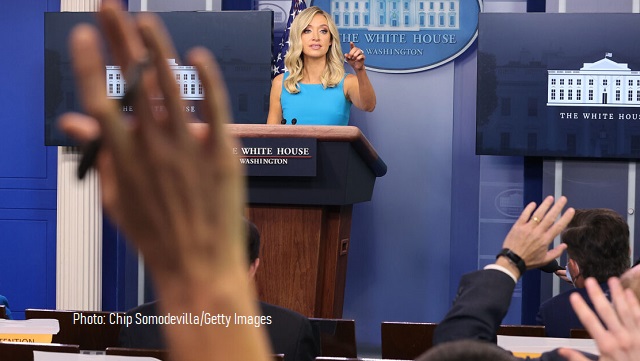Tweets of Washington Journalists Betray ‘Groupthink,’ Study Finds

Washington journalists’ tweets and interactions on Twitter show that those delivering news on government and politics to most Americans live in “more insular microbubbles than previously thought,” according to a new study.
These journalists display a “vulnerability to groupthink and blind spots,” the study says.
The study, by journalism professors Nikki Usher and Yee Man Margaret Ng of the University of Illinois, Urbana-Champaign, doesn’t directly assert that the “groupthink” is liberal.
However, it refers to traditional perceptions of the news media going back to at least 1964 and establishes what it calls the “peer-to-peer dynamics” of journalists. Media bias and promoting narratives has been a particular issue in recent years.
Two regimes are fighting an ideological war in America today. But what side are you on? And how can you sharpen up on how to defend your position? Learn more now >>
The study, published June 30, measured these dynamics through Twitter and concludes:
The dangers of journalists having limited perspectives are real. While this study does not purport to show possible worsening over time, it does provide support that shows siloed communities of journalists and thus offers an important, empirically grounded caveat about their vulnerability to groupthink and blind spots.
The study identifies nine clusters of news organizations, called “communities of practice,” that routinely retweet and interact with fellow members of their group. These include:
—The “elite/legacy community” is made up of journalists from The Washington Post, NPR, The New York Times, NBC News, and Politico.
—The “congressional journalism community” includes journalists from Bloomberg, Politico, the Associated Press, The Wall Street Journal, CQ Roll Call, and C-SPAN.
—The TV cluster includes journalists from ABC News, Fox News, and CBS News.
Separately, the study gives CNN its own cluster because so much of the Twitter interaction is between or among CNN employees:
In particular, it is concerning that CNN journalists are tweeting mostly to other CNN journalists about CNN. Even if this is an organizational mandate, it nonetheless serves as a powerful echo chamber that leaves CNN’s internal sense about what news matters unchecked and reconfirmed by those who work there.
The “critique of ‘Eastern Liberal Media’ generally dates to [Sen.] Barry Goldwater in the 1960s,” the report notes, referring to the Arizonan who was Republicans’ 1964 presidential nominee and adding that “‘elite media’ and ‘coastal elitism’ have reached a fever pitch in the Trump era.”
It says:
Journalists widely predicted that Hillary Clinton would win the 2016 election. The aftermath prompted renewed interest among journalists and scholars focused on the United States as to whether political journalists, particularly those in Washington, were in a ‘media bubble.’ …
U.S. journalists are more likely to be insulated in liberal political bubbles in big cities that are growing ‘bluer.’
The researchers do not try to say whether each journalist leans left or right based on Twitter. But, the study says the “clusters” suggest that journalists now tend to interact “within even smaller communities of like-minded journalists that have been previously considered.”
“If journalists are talking to even smaller groups of journalists who share similar orientations,” the study says, “there is a real concern about the limitations of these epistemic communities in generating knowledge and information for the public.”
COLUMN BY
Fred Lucas
Fred Lucas is the White House correspondent for The Daily Signal and co-host of “The Right Side of History” podcast. Lucas is also the author of “Tainted by Suspicion: The Secret Deals and Electoral Chaos of Disputed Presidential Elections.” Send an email to Fred. Twitter: @FredLucasWH.
RELATED ARTICLES:
Judicial Council Rightly Rebukes Judge Lynn Adelman for Law Review Diatribe
A Note for our Readers:
These are trying times in our nation’s history. Two regimes are fighting an ideological war in America today, with polar opposite viewpoints on public policy and the government’s role in our lives.
Our friends at The Heritage Foundation asked world-class speaker, educator, and researcher David Azerrad to walk you through his research and outline the differences between the “two regimes” in our society today—conservatism and progressivism—and their primary differences.
When you get access to this course today, you’ll learn key takeaways like what it means to be a conservative, what “modern progressivism” is, how a conservative worldview differs from a progressive one, and much, much more.
You will come away from this online course with a better understanding of the differing points of view, how they align with your principles, and how to defend your beliefs.
Don’t wait—start taking “The Case for Conservatism” course online now.
GET YOUR FREE ACCESS NOW »
EDITORS NOTE: This Daily Signal column is republished with permission. ©All rights reserved.


Leave a Reply
Want to join the discussion?Feel free to contribute!